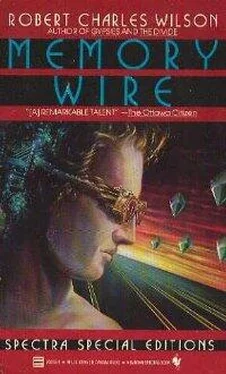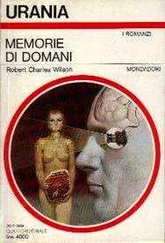Robert Wilson - Memory Wire
Здесь есть возможность читать онлайн «Robert Wilson - Memory Wire» весь текст электронной книги совершенно бесплатно (целиком полную версию без сокращений). В некоторых случаях можно слушать аудио, скачать через торрент в формате fb2 и присутствует краткое содержание. Год выпуска: 1987, ISBN: 1987, Издательство: Bantam Spectra, Жанр: Фантастика и фэнтези, на английском языке. Описание произведения, (предисловие) а так же отзывы посетителей доступны на портале библиотеки ЛибКат.
- Название:Memory Wire
- Автор:
- Издательство:Bantam Spectra
- Жанр:
- Год:1987
- ISBN:978-0-553-26853-9
- Рейтинг книги:4 / 5. Голосов: 1
-
Избранное:Добавить в избранное
- Отзывы:
-
Ваша оценка:
- 80
- 1
- 2
- 3
- 4
- 5
Memory Wire: краткое содержание, описание и аннотация
Предлагаем к чтению аннотацию, описание, краткое содержание или предисловие (зависит от того, что написал сам автор книги «Memory Wire»). Если вы не нашли необходимую информацию о книге — напишите в комментариях, мы постараемся отыскать её.
Memory Wire — читать онлайн бесплатно полную книгу (весь текст) целиком
Ниже представлен текст книги, разбитый по страницам. Система сохранения места последней прочитанной страницы, позволяет с удобством читать онлайн бесплатно книгу «Memory Wire», без необходимости каждый раз заново искать на чём Вы остановились. Поставьте закладку, и сможете в любой момент перейти на страницу, на которой закончили чтение.
Интервал:
Закладка:
He pulled away. For a moment he wanted to believe her, accept what she was offering him. But it was not in her power to forgive.
She knew. And that was unbearable.
“It doesn’t matter.” She followed him to the door. “Remember that, Ray. Do that for me, please. Please just remember.”
3. He rode a boat taxi down the market canal to the big chain-link fences that marked the mainland, and by the time he had located his car—parked this last month in a security garage—night had fallen. The urban access routes were crowded; the car audio pumped out dizzying rondos of pulse music, muscular and grim. The city was a river of light and concrete rolling from the Mexican border up into the dry conduit suburbs, from the ocean to the desert; and after Brazil, he thought, it should have been daunting. But it was not. It intoxicated him.
In these night canyons he was one among many, finally anonymous; here he might lose his guilt, his memories, his history, himself.
CHAPTER 17
1. A Thai taxiboat driver led Oberg to the empty studio by the tidal dam.
It was an impressive balsa. Oberg looked up at it from the tiny canal dock abutting the pontoon walkway and said, “She lives here?”
“Did,” the driver said laconically. “Maybe still does. Though I haven’t seen her lately.” He waited, pointedly. Oberg pressed a few faded cash notes into his hand; he nodded and sent his boat whirring away.
Alone, Oberg climbed a mossy concrete stairway to the boardwalk and casually forced the door.
There was dust inside.
He had expected as much. They would not have come back here. They were wiser than that. It had been too easy tracing her: she had dozens of contacts among mainland art dealers and in the galleries up the coastal highway. She had been, by every account, a woman of predictable habits.
So she had not come back here, and he had anticipated that, but he remained convinced of two things: that she had gone to ground somewhere in the Floats, and that—it was pretty much inevitable—he would find her.
What he wanted here, in this closed green bamboo retreat she had once inhabited, was as much mystical as practical: a sense of her presence, a token of her life.
The still air stirred around him. Quietly now, he moved up the stairs.
He had taught himself about the Floats.
It was not a single community. The plural noun was necessary. Years ago, in a decade-long infusion of state and federal funding, the tidal dams had been erected off the California coast. It was a feat of engineering as ambitious as the building of the Great Wall, and it represented the pressing need for energy resources rolling over a host of practical and ecological objections. After years of cost overruns and the extinction of a half-dozen minor marine species, the project went successfully on-line; even today it supplied most of the electrical power soaked up by the urban sprawl. Inevitably, not enough; but there were the Baja and Sonora photic generators shouldering the overload, technologies the Exotic stones had made practical.
More important from Oberg’s perspective was the demimonde that had grown up in the shadow of the dam. The becalmed and enclosed coastal waters were initially a kind of industrial free zone. There were massive landfill projects off Long Beach, deepwater shipping bays abutting the Harbor Dam. Inevitably, a population moved in to feed the market for semiskilled labor. Just as inevitably, many of these were semilegals with dubious documentation. The first crude boat slums were erected in the lee of the factories, but the population grew even when the new industries faltered in the face of competing Exotic technologies. Squatters occupied the shells of abandoned warehouses.
The unemployment riots of the ’30s had established for the first time a perimeter of autonomy, a border beyond which the civic and harbor police refused to venture. The County of Los Angeles withdrew its official jurisdiction in a series of negotiated settlements with strike leaders. It was a precedent. Even after the fire that swept the floating ghettos in the late ’30s, the only government agency with real power in the Floats was the Public Works Department.
And so the Floats had grown into a refuge for anyone who fell through the cracks of the mainland world: artists, criminals, addicts, the black market; undocumented immigrants and the chronically poor. Within its vast acreage of pontoon bridges, balsas, and canals, there were a dozen autonomous communities. Slums spilled out from the urban mainland, dangerous places in which, Oberg understood, any life was negotiable. Elsewhere, and particularly here in the more spacious north, real communities had been created. There was money, employment, a limited commerce with the outside world. People moved back and forth. A place to live, Oberg thought. Especially, he thought, a place to hide.
But no place could hide her for long. He understood, climbing the stairs, that his separation from the Agencies had been both necessary and inevitable. He was no longer bound by Agency protocols. He could move in this twilight place, away from the mainland. He was a loose cannon. He could roll where he liked.
The thought made him smile. See me roll.
He moved lightly over the wooden floor of the room that had been her studio.
It was a spacious room set around with windows. Parallel angles of sunlight divided the floor. He opened drawers, peered behind mirrors. He did all this methodically and in a state of finely tuned concentration. He was not sure what he was looking for: only that he would know it when he saw it.
He saw it, at last, nestled at the back of a dresser drawer behind a pastel cotton shirt. It was a tiny plastic vial about the size of a film canister, unlabeled. In the opaque hollow of it, something rattled.
He pried up the lid with his thumbnail.
The odor was faint, pungent, attractive. He rolled out a tiny black pill onto his palm. The pill was resinous with age; there was only one.
It was something she had saved, he thought. A kind of insurance; or a proof of something, an object lesson.
He touched his finger to the oil at the bottom of the vial and raised it to his tongue.
Bitter, astringent taste. But the faintest sense of well-being swept through his body.
Enkephalins, he thought. In potent concentration.
He tumbled the pill back into its container, snapped shut the lid.
For the second time, he smiled to himself.
2. Her dreams were worse after Keller left.
The little girl again, of course. But the tone of the dream had changed. She had learned too much from the Pau Seco stone. The little girl appeared against a terrifying montage of the fire: flame, smoke, and frightened faces. Her eyes were wide and soot-streaked, and she was alone, cut off from the mainland, afraid for her life.
“I need you,” the girl said. “I saved you once! It’s only fair! You can’t let me die here!”
But in the dreams she could only turn away.
The dreams left her sweating. She woke up alone at the back of this new balsa deep in the Floats, lost a moment in the darkness, the unfamiliar spaces. Byron slept in the front room, which doubled as kitchen; she slept in the back. Stirring, she felt as hollow as a bottle tossed up from the sea. The floor rose in a momentary swell, as if a hand had lifted the boat. She closed her eyes resolutely and prayed that she would not dream again.
Morning came hours later, a lightening at the room’s single high window.
She sat up, wrapped a robe around herself, drew a deep breath. Since Belem she had felt mostly numb. Numb and rootless and empty. The way Keller felt, maybe. Angel fugue. Except she was not an Angel. Only herself, moving through this fog. Periodically she would ask herself how she felt, how she really felt, but it was like tonguing an abscessed tooth: the pain overwhelmed the curiosity.
Читать дальшеИнтервал:
Закладка:
Похожие книги на «Memory Wire»
Представляем Вашему вниманию похожие книги на «Memory Wire» списком для выбора. Мы отобрали схожую по названию и смыслу литературу в надежде предоставить читателям больше вариантов отыскать новые, интересные, ещё непрочитанные произведения.
Обсуждение, отзывы о книге «Memory Wire» и просто собственные мнения читателей. Оставьте ваши комментарии, напишите, что Вы думаете о произведении, его смысле или главных героях. Укажите что конкретно понравилось, а что нет, и почему Вы так считаете.












